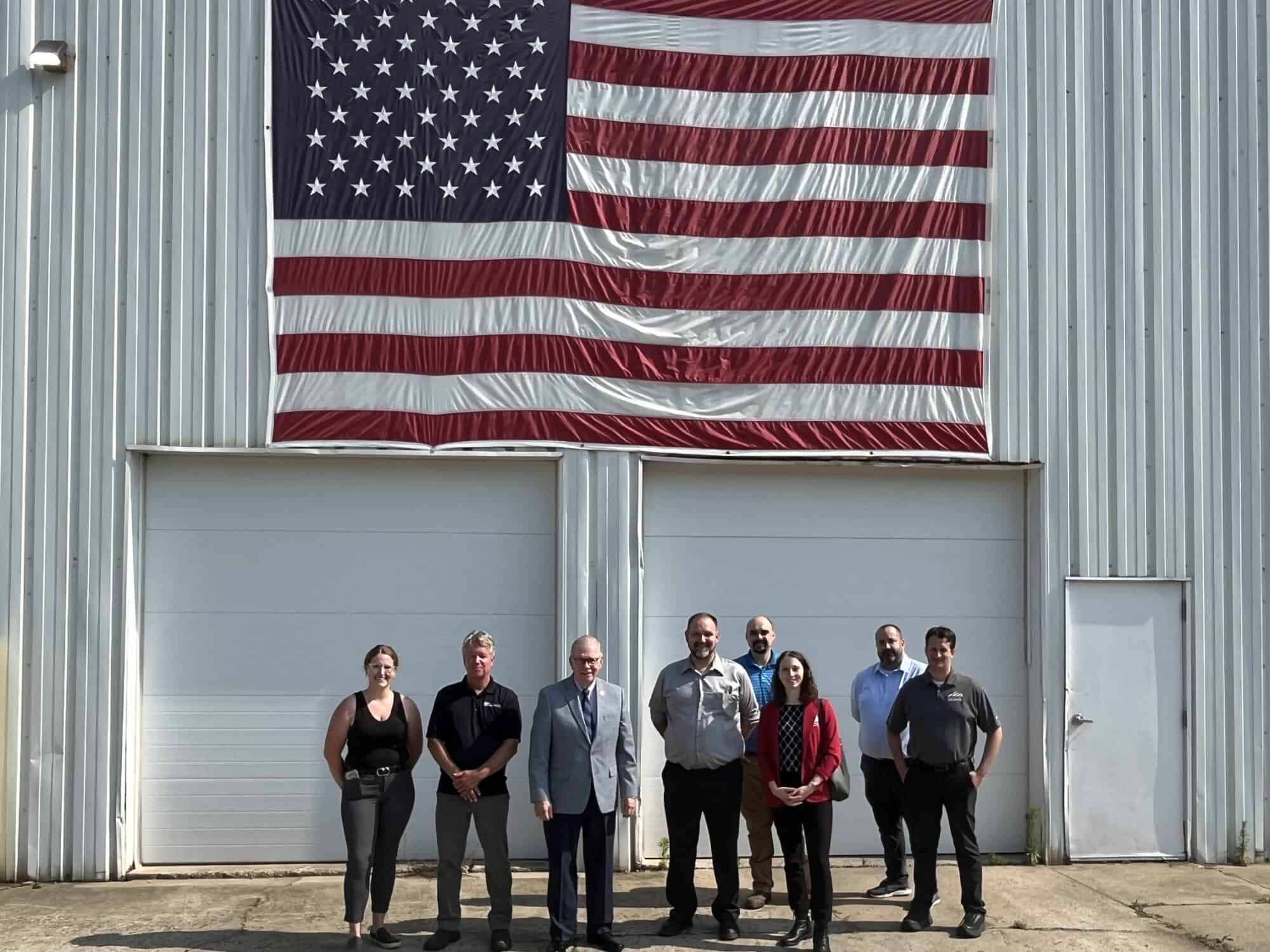Q&A: The Looming 2025 Tax Challenge
Visit Manufacturing Wins
VISITThe NAM recently launched “Manufacturing Wins,” the manufacturing industry’s campaign to preserve the benefits of the 2017 tax reforms that are currently scheduled to disappear in 2025—particularly those tax incentives that make it easier for small manufacturers to hire employees and raise wages, invest in equipment, grow their businesses and contribute more to their communities.
NAM Vice President of Domestic Policy Charles Crain explains what’s at stake in 2025 and how manufacturers can get involved in the effort to prevent tax increases.
Q: Manufacturers are facing “tax Armageddon” at the end of 2025. Can you explain what’s happening?
Crain: Tax reform in 2017 was rocket fuel for manufacturers, leading to record job creation, capital investment and economic growth. For example, manufacturing production grew 2.7% in 2018, with December 2018 being the best month for manufacturing output since May 2008. Manufacturing capital spending grew 4.5% and 5.7% in 2018 and 2019, respectively—this shows the direct impact of pro-growth tax incentives on manufacturers investing in new equipment and facilities. But many of tax reform’s pro-manufacturing provisions will expire at the end of 2025. If these provisions are allowed to expire, virtually every manufacturer will face devastating tax increases.
Q: What policies will sunset in 2025, and how will their expiration impact SMMs?
Crain: For small manufacturers organized as pass-throughs—meaning the business’s owners pay tax on the business’s income on their personal returns—two key changes are coming down the pike. First, their tax rate will increase, from 37% to 39.6%. Second, they will lose the pass-through deduction, which provides a tax deduction equal to 20% of the business’s income. In combination, these tax hikes will increase pass-throughs’ effective tax rate by at least 10 percentage points (from 29.6% to 39.6%), resulting in significantly less capital available for equipment purchases, job creation and community investment.
For small manufacturers organized as corporations, the NAM is fighting to prevent any increases in the corporate tax rate. The corporate rate decreased from 35% to 21% in 2017 and is not scheduled to expire—but President Joe Biden has proposed increasing the rate to 28%. The NAM remains staunchly opposed to corporate tax rate increases that punish manufacturers for investing and creating jobs here in America.
For family-owned small manufacturers, their estate tax obligations are scheduled to increase. Tax reform doubled the value of assets that can be passed on without incurring the estate tax; at the end of 2025, the estate tax exemption threshold is scheduled to be reduced by half. The NAM is calling on Congress to maintain the increased exemption—or to repeal the estate tax entirely, preventing family-owned businesses from being sold for parts to pay a tax bill when a loved one passes away.
Q: What else is at stake in 2025?
Crain: Manufacturers of all sizes continue to face uncertainty about the tax code’s treatment of R&D expenses, capital equipment purchases and interest on business loans. Immediate R&D expensing—which allows manufacturers to write off the entire cost of R&D spending in the year incurred—expired in 2022. So did a tax reform provision that allowed businesses to deduct more of the interest they pay on loans when they debt finance a project. And in 2023, 100% accelerated depreciation—which reduces the cost of capital equipment purchases—began to phase down. These expired provisions are vital to manufacturing growth, and the NAM is working to restore and extend them as Congress prepares for the 2025 tax fight.
Q: How can SMMs learn more?
Crain: The NAM recently published “What’s At Stake: Manufacturers Face Devastating Tax Increases in 2025,” which highlights the tax reform provisions that will expire at the end of 2025. The NAM calls on Congress to act to prevent these expirations from stunting manufacturing job creation, growth and innovation.
Q: How can SMMs get involved?
Crain: Manufacturing voices are crucial to the 2025 tax fight. NAM members with a story to tell about the impact of 2017 tax reform on their business—or the damage that the 2025 expirations could inflict—are encouraged to reach out to their NAM membership advisor or to the NAM tax team.
You can also take a few minutes to record a video testimonial calling on Congress to prevent devastating tax hikes on manufacturers. Instructions for submitting a video testimonial are available here—it’s as easy as having a coworker use a smartphone to film a video of you on your shop floor! Completed testimonials can be emailed to the Manufacturing Wins team to be posted to our campaign site: NAM.org/MfgWins
Supreme Court Decision is Game-Changing Transformation for Legal and Regulatory Landscape for Manufacturers
Washington, D.C. – Today, the United States Supreme Court overruled the Chevron doctrine—a requirement that federal courts defer to an administrative agency’s interpretation of an ambiguous statute—that had proven unworkable and incoherent.
“The legal and regulatory landscape has transformed in the blink of an eye. Manufacturers will not waste a moment in seizing this opportunity—an opportunity that we have never seen before—to leverage this decision to rein in the regulations that are holding back manufacturers from improving lives,” said National Association of Manufacturers President and CEO Jay Timmons. “The NAM Legal Center and our best-in-class advocacy team will be on the field, leveraging this decision and the new tools it gives us, to fight back new regulations we are facing today as well as whatever may come our way in the next administration. For anyone who wants to see manufacturing grow and succeed in America, today heralds the possibility for a much brighter future.”
“Today’s ruling is a game changer for manufacturers as Chevron was at least partly to blame for the unpredictability and overreach that have become synonymous with the modern regulatory state,” said NAM Chief Legal Officer Linda Kelly. “We are hopeful that this marks the end of an overbearing regulatory system that had become complex, and compliance in many cases that was contradictory from agency to agency. For the past 40 years, Chevron has tipped the scales in favor of unelected officials and against the regulated public. Now the onus is on Congress to provide clear guardrails and guidelines in its intent to ensure that laws are implemented in a manner that achieves their goal. Manufacturers are eager to work with lawmakers to develop policies that promote innovation, job creation, economic growth and improved quality of life for all Americans.”
“Manufacturers have been the subject of a regulatory onslaught, with agencies’ far-reaching decisions affecting companies of all sizes,” said NAM Managing Vice President of Policy Chris Netram. “The EPA, SEC and DOL—the aggressive nature of rulemaking and enforcement actions that exceed authority come from the alphabet soup of regulators. The NAM has been successful in fighting key rules in court, and today’s decision gives us the ability to challenge even more actions while ensuring future agency actions do not exceed the authority mandated by Congress.”
-NAM-
The National Association of Manufacturers is the largest manufacturing association in the United States, representing small and large manufacturers in every industrial sector and in all 50 states. Manufacturing employs nearly 13 million men and women, contributes $2.89 trillion to the U.S. economy annually and accounts for 53% of private-sector research and development. The NAM is the powerful voice of the manufacturing community and the leading advocate for a policy agenda that helps manufacturers compete in the global economy and create jobs across the United States. For more information about the NAM or to follow us on Twitter and Facebook, please visit www.nam.org.
NAM to Tax Teams: Preserve Tax Provisions Before They Expire

Raising taxes on manufacturers would damage the industry and the U.S. economy as a whole, the NAM told the House Ways and Means Committee this week. That’s why it’s crucial that Congress preserve set-to-expire tax reform provisions.
What’s going on: In a continuation of its Manufacturing Wins campaign, the NAM conveyed a clear message to six of the committee’s specialized “Tax Teams”: act now to protect manufacturers from tax increases.
Why it’s important: Failure to act before the end of next year, when key provisions from 2017 tax reform are set to expire, would result in higher taxes on virtually all manufacturers—which “will cost millions of jobs and put the American manufacturing sector at a severe disadvantage globally,” the NAM wrote.
What’s at stake: The NAM highlighted manufacturers’ top tax priorities for the Tax Teams, discussing why preserving pro-growth tax policy is vital for manufacturers in the United States:
- In communication with the Main Street Tax Team, the NAM called on Congress to preserve tax reform’s reduced individual income tax rates and maintain the 20% pass-through deduction. It emphasized for the Supply Chain Tax Team the importance of tax reform’s reduction in the corporate tax rate, which brought the U.S. from one of the highest rates in the world to a globally competitive 21%. The Global Competitiveness Tax Team received a similar message.
- The NAM detailed for the Rural America Tax Team the damage the estate tax imposes on family-owned manufacturers, and why Congress should not allow more family-owned businesses’ assets to be subject to the estate tax at the end of 2025.
- The NAM continued to push for pro-growth, pro-innovation R&D tax incentives with the U.S. Innovation Tax Team, and it enumerated for the Manufacturing Tax Team the full range of policies that will impact manufacturers at the end of 2025—and called for urgent congressional action to protect manufacturers from tax hikes.
The final word: “Manufacturers of all sizes, throughout the supply chain, are calling on Congress to preserve tax reform in its entirety,” said NAM Vice President of Domestic Policy Charles Crain. “Manufacturers and manufacturing families simply cannot afford the devastating tax increases scheduled for the end of 2025 if Congress fails to act.”
Manufacturers Score Victory on Proxy Firms

The NAM achieved a significant victory in court Wednesday in a case that sought to bring needed oversight to proxy advisory firms—and, more broadly, to ensure regulatory certainty for manufacturers.
The background: Proxy firms make recommendations regarding the way shareholders should vote on proxy ballot proposals that come before public companies.
- These firms operate with minimal oversight despite their outsized influence and even though their decisions can have significant and sometimes harmful impacts.
The fight: In 2020, the Securities and Exchange Commission finalized an NAM-backed rule that included a range of modest but critical reforms to proxy firms’ business models.
- In particular, the 2020 rule ensured that companies had more information about the firms’ voting recommendations and provided investors with companies’ responses to those recommendations.
- But in 2022, the SEC rescinded critical portions of that rule.
- The NAM sued the SEC, asking the U.S. Court of Appeals for the Fifth Circuit to strike down this arbitrary and capricious agency action.
The victory: This week—in news covered by Reuters, POLITICO Pro (subscription), Law360 (subscription), Pensions & Investments (subscription) and Bloomberg (subscription)—the Fifth Circuit ruled in the NAM’s favor, deciding that the SEC acted unlawfully in rescinding the 2020 rule. In particular, the court made two critical points:
- The court held that the SEC’s stated justification for its decisions to rescind NAM-supported proxy firm reforms didn’t pass muster and called the agency’s reasoning “facially irrational” and not “reasonable [or] reasonably explained.”
- The court also ruled that a government agency reversing course despite no change in its underlying factual findings must “explain its about-face” by “giv[ing] a more detailed explanation” than the SEC provided.
- This ruling builds on existing case law that prevents agencies from arbitrarily reversing policies after administrations change, thus encouraging regulatory certainty for manufacturers.
Our take: “This decision confirms that federal agencies are bound by the rule of law, even as administrations change,” said NAM Chief Legal Officer Linda Kelly.
- “Manufacturers depend on the SEC to be a steady regulatory hand at the wheel of America’s world-leading capital markets—an obligation the agency abandoned in rescinding the commonsense, compromise 2020 proxy advisory firm rule. … We will continue to fight in court to uphold the 2020 rule—and to work with the SEC and with Congress to ensure appropriate oversight of these powerful actors.”
Manufacturers Victorious Over SEC in Fifth Circuit Proxy Firm Case
Decision confirms that federal agencies are bound by the rule of law, even as administrations change
Washington, D.C.–Yesterday, the U.S. Court of Appeals for the Fifth Circuit ruled in the National Association of Manufacturers’ favor in NAM v. SEC, overturning the Securities and Exchange Commission’s rescission of critical provisions of its 2020 proxy advisory firm rule. NAM Chief Legal Officer Linda Kelly released the following statement on the ruling:
“This decision confirms that federal agencies are bound by the rule of law, even as administrations change. Manufacturers depend on the SEC to be a steady regulatory hand at the wheel of America’s world-leading capital markets—an obligation the agency abandoned in rescinding the commonsense, compromise 2020 proxy advisory firm rule.
“The NAM Legal Center is proud to have secured this critical victory, which strikes down the SEC’s unlawful about-face and preserves important provisions from the 2020 rule designed to protect manufacturers and Main Street investors from proxy firms’ outsized influence. We will continue to fight in court to uphold the 2020 rule—and to work with the SEC and with Congress to ensure appropriate oversight of these powerful actors.”
Background:
- The NAM has long called for increased oversight of proxy advisory firms. In July 2020, the SEC issued final regulations to enhance transparency and accountability for proxy firms, a move NAM President Jay Timmons called a “long-sought, major win for the industry and millions of manufacturing workers.” In October 2020, the NAM filed a motion to intervene in ISS v. SEC (ISS’s attempt to overturn the rule) in support of these reforms—a case that is still ongoing in the U.S. Court of Appeals for the D.C. Circuit.
- In June 2021, the SEC announced that it was suspending enforcement of the 2020 rule; the NAM filed suit against the SEC in October 2021 challenging this unlawful suspension. The U.S. District Court for the Western District of Texas ruled in the NAM’s favor in that case, vacating the SEC’s suspension of the rule.
- In July 2022, the SEC rescinded critical portions of the 2020 rule, a move that Timmons said “epitomizes ‘arbitrary and capricious’ rulemaking”; the NAM later filed suit to challenge the rescission. The Fifth Circuit decision overturns the SEC’s 2022 rescission of important provisions that increased transparency into proxy firms’ recommendations.
-NAM-
The National Association of Manufacturers is the largest manufacturing association in the United States, representing small and large manufacturers in every industrial sector and in all 50 states. Manufacturing employs nearly 13 million men and women, contributes $2.89 trillion to the U.S. economy annually and accounts for 53% of private-sector research and development. The NAM is the powerful voice of the manufacturing community and the leading advocate for a policy agenda that helps manufacturers compete in the global economy and create jobs across the United States. For more information about the NAM or to follow us on Twitter and Facebook, please visit www.nam.org.
Manufacturers to Congress: Stop Devastating Tax Increases
Jobs, innovation, investments in America all at risk if tax provisions expire at the end of 2025
Washington, D.C. – The National Association of Manufacturers released its Manufacturers’ Outlook Survey for the second quarter of 2024, which highlights the immediate need for Congress to take action to prevent tax increases that will limit the industry’s ability to create jobs, support their communities and compete in the global economy.
“When Congress passed tax reform, manufacturers in the U.S. invested in their workers and businesses at a level that had never before been seen. In 2018, we experienced the best year for job creation in 21 years and the best year for wage growth in 15,” said NAM President and CEO Jay Timmons. “Tax reform was rocket fuel for our industry, but our latest Manufacturers’ Outlook Survey illustrates our industry’s deep concerns about the reversal of these pro-growth incentives. If Congress does not take action, job creation, wage growth and investments in communities—in short, America’s manufacturing edge—will be at risk, as well as our country’s ability to attract meaningful investments into our economy. The House, the Senate and the White House need to come together to reinstate the critical provisions that have already expired or begun phasing out, and to stand strong to protect those set to expire at the end of 2025.”
Background:
- The NAM released “What’s At Stake: Manufacturers Face Damaging Tax Increases in 2025,” a policy explainer which illustrates the consequences of allowing the pro-growth policies and rates from the Tax Cuts and Jobs Act to expire.
- The “Manufacturing Wins” issue page on NAM.org provides a hub for 2025 tax content, as well as opportunities for manufacturers to share their stories directly with Congress and the administration.
Key Survey Findings:
- If Congress does not act to prevent tax increases, survey respondents say that increased taxes will limit capital investment opportunities (73.0%), decrease job creation (65.4%), increase difficulty competing globally (52.6%) and reduce R&D spending (51.7%).
- Nearly 94% of respondents agree that Congress should act before the end of 2025 to prevent scheduled tax increases on manufacturers.
- In Q2, 71.9% of respondents felt either somewhat or very positive about their company’s outlook, the seventh straight reading below the moving average (74.8%).
- More than 67% of manufacturers cited the inability to attract and retain employees as their top primary challenge, followed by rising health care costs (66.7%), an unfavorable business climate (59.6%) and a weaker domestic economy (56.8%).
The NAM releases these results to the public each quarter. Further information on the survey is available here.
-NAM-
The National Association of Manufacturers is the largest manufacturing association in the United States, representing small and large manufacturers in every industrial sector and in all 50 states. Manufacturing employs nearly 13 million men and women, contributes $2.89 trillion to the U.S. economy annually and accounts for 53% of private-sector research and development. The NAM is the powerful voice of the manufacturing community and the leading advocate for a policy agenda that helps manufacturers compete in the global economy and create jobs across the United States. For more information about the NAM or to follow us on Twitter and Facebook, please visit www.nam.org.
NYT Investigation: Pharmacy Benefit Managers Drive Up Costs for Employers

Although they were created to keep prescription drug prices down, pharmacy benefit managers “frequently do the opposite” (The New York Times, subscription)—and that’s one of the main reasons the NAM has long advocated for their reform.
What’s going on: “The job of the P.B.M.s is to reduce drug costs. Instead, they …
steer patients toward pricier drugs, charge steep markups on what would otherwise be inexpensive medicines and extract billions of dollars in hidden fees, a New York Times investigation found.”
Why it’s important: PBMs frequently charge employers and government programs, such as Medicare, many times the wholesale cost of a medication and keep the difference, according to the Times.
- And it’s not just those taking prescriptions who pay; when drug costs are inflated, everyone ends up paying higher insurance premiums.
- What’s more, “[b]ecause of recent mergers, [the big three PBMs] are becoming more dominant, collectively processing roughly 80 percent of prescriptions in the United States.” That’s up more than 30% from just 12 years ago.
Working around a workaround: In 2018, in response to growing pressure from employers to get PBMs to share more of the discounts from drug manufacturers, PBMs set up entities known as group purchasing organizations.
- These GPOs pass savings to employers—but they “also began imposing new fees on drug manufacturers,” money they were not contractually bound to pass on to clients.
- The result: “Employers are none the wiser. They receive rebates. But they can’t see the billions of dollars in fees that the G.P.O.s take for themselves.”
Congress makes moves: Since the beginning of last year, seven House and Senate committees have passed PBM-reform legislation, including policies to increase transparency into PBMs’ business practices, delink PBM compensation from medications’ list prices and ensure that rebates are fully passed through to the plan sponsor or patient.
- The NAM has been crucial in educating lawmakers on the need for these reforms and continues to advocate for PBM reform to be signed into law this year.
The last word: “PBMs drive up health care costs for manufacturers and manufacturing workers,” said NAM Vice President of Domestic Policy Charles Crain. “Congress must act as soon as possible to enact comprehensive PBM reform that benefits employers by making PBM contracts more straightforward, transparent and predictable—and benefits workers by reducing the prices they pay out of pocket for their prescriptions.”
Rep. Walberg Visits Madsen Steel Wire Products to Discuss Tax Priorities

Rep. Tim Walberg (R-MI) recently visited Madsen Steel Wire Products in Bronson, Michigan, to discuss critical tax priorities with company leadership and members of the National Association of Manufacturers.
The visit, led by Madsen Steel Wire Products General Manager Steve Cochran, focused on the importance of maintaining a competitive tax code to support growth and innovation in the manufacturing sector in the face of scheduled expirations of key pro-manufacturing tax policies in 2025. The visit also underscored the essential role manufacturing plays in economic growth and stability.
The topline: During the tour, Rep. Walberg witnessed firsthand the impact of pro-growth tax policies on manufacturers.
- “Visiting Madsen Steel Wire Products reinforced the need for tax policy that supports manufacturing growth and job creation,” Walberg said. “We in Congress must act before the end of 2025 to preserve 2017 tax reform and avoid the devastating impacts to small manufacturers that will come to pass if these pro-growth policies are not preserved.”
A close-up view: Cochran shared the company’s experience with 2017 tax reform, highlighting how tax reform enabled significant investments in new equipment and workforce expansion.
- “Tax reform in 2017 was a game-changer for us; it allowed us to invest in our people and technology, driving our competitive edge,” said Cochran. “But the looming expiration of key tax reform provisions creates significant uncertainty for our future planning.”
- “In particular, we face a potential double-whammy as our tax rates are scheduled to increase next year at the same time the pass-through deduction expires—resulting in significant and damaging tax increases for us and other small manufacturers.”
An economic impact: The economic impact of manufacturing on local communities was a central theme of the discussion.
- “Manufacturers like Madsen Steel Wire Products are vital to communities like Bronson,” said Branch County Economic Growth Alliance Director Audrey Tappenden. “Their strength is critical to our local economy and broader industries.”
The big picture: Walberg and Cochran also discussed the broader economic impact of tax reform. The NAM’s recent survey found that 94% of manufacturers believe Congress should act before the end of 2025 to prevent tax increases. The survey also indicated that if tax increases take effect, 73% of manufacturers would limit capital investments and 65% would reduce job creation.
- “Manufacturing is the backbone of our local economy,” said Cochran. “Our ability to invest in new technologies and expand our workforce is dependent on preserving tax reform, which will directly translate to more jobs and better wages for our community.”
The bottom line: “The stakes are high,” said Walberg. “We need to ensure that the tax code continues to support the hardworking men and women in manufacturing. It’s about maintaining a level playing field and ensuring that manufacturers like Madsen Steel Wire Products can thrive—supporting small business growth and the economic health and prosperity of our communities.”
The takeaway: “The NAM launched ‘Manufacturing Wins ’ to preserve tax reform, and Rep. Walberg’s visit to Madsen Steel underscores the critical role of tax policy in driving the success of manufacturers in America,” said NAM Vice President of Domestic Policy Charles Crain. “Congress must act before the end of 2025 to prevent devastating tax increases—bolstering manufacturing across the country and supporting the economic stability and growth of local communities like Bronson, Michigan.”
AI Speeds Drug Development

High-tech drug development labs are training artificial intelligence to design therapeutic treatments more quickly, The New York Times (subscription) reports.
What it looks like: Laboratories are using processes that record huge amounts of data quickly and efficiently—a practice that technology has made possible.
- “[T]he real action is happening at nanoscale: Proteins in solution combine with chemical molecules held in minuscule wells in custom silicon chips that are like microscopic muffin tins. Every interaction is recorded, millions and millions each day, generating 50 terabytes of raw data daily—the equivalent of more than 12,000 movies.”
How it works: By harvesting tremendous amounts of data with mechanized accuracy, these labs can use AI tools to perform rapid experiments, recognize patterns and make predictions about possible solutions—all more quickly than a human practitioner.
- “The companies are leveraging the new technology—which learns from huge amounts of data to generate answers—to try to remake drug discovery. They are moving the field from a painstaking artisanal craft to more automated precision, a shift fueled by AI that learns and gets smarter.”
Why it’s exciting: Traditional drug development processes are typically extremely slow and expensive and frequently end in failure during the human clinical trials stage—often because the drug is not effective enough, or because drugmakers discover unforeseen side effects. With the benefit of AI, biopharmaceutical companies may be able to overcome these challenges.
- “Studies of the cost of designing a drug and navigating clinical trials to final approval vary widely. But the total expense is estimated at $1 billion on average. It takes 10 to 15 years. And nearly 90% of the candidate drugs that enter human clinical trials fail.”
Why it’s safe: The practice is designed to prevent the kind of issues that tend to plague generative AI, and any final medicine still requires significant human input.
- “Because AI for drug development is powered by precise scientific data, toxic ‘hallucinations’ are far less likely than with more broadly trained chatbots. And any potential drug must undergo extensive testing in labs and in clinical trials before it is approved for patients.”
Our take: During a recent event with Axios, titled “Balancing Innovation vs. Regulation,” NAM President and CEO Jay Timmons touched on some of the pioneering work biopharmaceuticals are doing using AI.
- “All of the innovations in the biopharmaceutical industry … are creating new cures for diseases that we’ve been battling for the whole history of mankind,” said Timmons. “We’re accomplishing all of these things now—and it’s so exciting.”
Dig deeper: The NAM’s first-of-its-kind report, “Working Smarter: How Manufacturers Are Using Artificial Intelligence,” details use cases for AI in manufacturing and case studies of how manufacturers are implementing AI technologies. In the report, Johnson & Johnson Executive Vice President and Chief Technical Operations & Risk Officer and NAM Board Chair Kathy Wengel shares how J&J uses AI in clinical trials.
- “When we conduct clinical trials, AI helps us more efficiently establish safety and effectiveness guardrails, while allowing us to conduct trials at a larger scale,” writes Wengel. “AI also gives us a far stronger mastery over our supply chains. Overall, it helps our people do a better job of living up to our commitment of improving health care outcomes and making our towns, country and world a better place.”
Manufacturers Rally to Advance Nuclear Energy

The NAM is pressing the U.S. Senate to support a bill that would promote clean nuclear energy development.
What it does: The legislation, called the Accelerating Deployment of Versatile, Advanced Nuclear for Clean Energy (ADVANCE) Act, offers a number of components to accelerate the development and commercialization of advanced nuclear reactor technologies. It includes:
- Permitting and approval reform to make it easier for reactor projects to locate on brownfield sites, land that is underused or has been abandoned because of industrial waste;
- “Early licensing work” provisions to help deploy reactors more quickly at national security infrastructure sites;
- A series of awards to encourage companies to develop advanced-reactor technology; and
- Hiring support for the Nuclear Regulatory Commission, which is understaffed to deal with the level of applications for new reactors.
Where it stands: The legislation was reported out of the Senate Environment and Public Works Committee with a bipartisan vote of 16–3, and companion legislation was passed in the House of Representatives by an overwhelming vote of 365–36. Now, the NAM is pushing the Senate to pass the bill.
Why it matters: “Nuclear-generated power is an important part of an all-of-the-above energy strategy, which is necessary to meet the power needs of a growing manufacturing sector,” said NAM Managing Vice President of Policy Chris Netram. “The ADVANCE Act would accelerate the development and commercialization of advanced nuclear reactor technologies through reforms to the existing licensing and permitting systems.”
Our action: The NAM is urging Congress to support the bill ahead of the Senate’s vote, detailing its benefits in a letter to senators.
The last word: “Manufacturers create jobs that support families, and develop and deploy innovative technologies that make our environment cleaner,” said Netram. “Increasing our nation’s energy supply, including the growth of nuclear power, will support manufacturing investments and jobs across America.”
